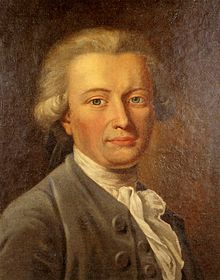Georg Forster FRS | |
|---|---|
 Georg Forster at age 26, by J. H. W. Tischbein, 1781 | |
| Born | Johann George Adam Forster 27 November 1754 |
| Died | 10 January 1794 (aged 39) |
| Education | Saint Peter's School (Saint Petersburg), Warrington Academy |
| Known for | Founding modern travel literature |
| Spouse | Therese Heyne |
| Children | Therese Forster |
| Parent(s) | Johann Reinhold Forster and Justina Elisabeth, née Nicolai |
| Awards | Fellow of the Royal Society, 1777 |
| Scientific career | |
| Fields | natural history, ethnology |
| Institutions | Vilnius University, University of Mainz, Collegium Carolinum (Kassel) |
| Patrons | Catherine the Great |
| Author abbrev. (botany) | G.Forst. |
| Signature | |
Johann George Adam Forster, also known as Georg Forster[nb 1] (German pronunciation: [ˈɡeːɔʁk ˈfɔʁstɐ], 27 November 1754 – 10 January 1794), was a German geographer, naturalist, ethnologist, travel writer, journalist and revolutionary. At an early age, he accompanied his father, Johann Reinhold Forster, on several scientific expeditions, including James Cook's second voyage to the Pacific. His report of that journey, A Voyage Round the World, contributed significantly to the ethnology of the people of Polynesia and remains a respected work. As a result of the report, Forster, who was admitted to the Royal Society at the early age of twenty-two, came to be considered one of the founders of modern scientific travel literature.
After returning to continental Europe, Forster turned toward academia. He taught natural history at the Collegium Carolinum in the Ottoneum, Kassel (1778–84), and later at the Academy of Vilna (Vilnius University) (1784–87). In 1788, he became head librarian at the University of Mainz. Most of his scientific work during this time consisted of essays on botany and ethnology, but he also prefaced and translated many books about travel and exploration, including a German translation of Cook's diaries.
Forster was a central figure of the Enlightenment in Germany, and corresponded with most of its adherents, including his close friend Georg Christoph Lichtenberg. His ideas, travelogues and personality influenced Alexander von Humboldt, one of the great scientists of the 19th century[5] who hailed Forster as the founder of both comparative ethnology (Völkerkunde) and regional geography (Länderkunde).[6] When the French took control of Mainz in 1792, Forster played a leading role in the Mainz Republic, the earliest republican state in Germany. During July 1793 and while he was in Paris as a delegate of the young Mainz Republic, Prussian and Austrian coalition forces regained control of the city and Forster was declared an outlaw. Unable to return to Germany and separated from his friends and family, he died in Paris of illness in early 1794, not yet 40.
The standard author abbreviation G.Forst. is used to indicate this person as the author when citing a botanical name.[7]
- ^ Gordon 1975, p. 9.
- ^ Thomas & Berghof 2000, p. 425.
- ^ Saine 1972.
- ^ Rosove 2015.
- ^ Daum 2019b, pp. 19–21, 43.
- ^ Alexander von Humboldt in Kosmos (1874), quoted in Jovanović, Lazar, 2020. “The Cosmopolitan Circumnavigator of the South Seas: A Biography of Georg Forster”, in Bérose - Encyclopédie internationale des histoires de l'anthropologie, Paris.
- ^ International Plant Names Index. G.Forst.
Cite error: There are <ref group=nb> tags on this page, but the references will not show without a {{reflist|group=nb}} template (see the help page).